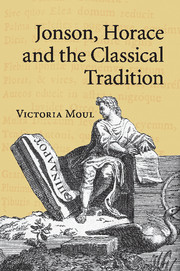Book contents
- Frontmatter
- Contents
- Acknowledgements
- List of abbreviations
- Introduction: imitation, allusion, translation: reading Jonson's Horace
- 1 Jonson's Odes: Horatian lyric presence and the dialogue with Pindar
- 2 Horatian libertas in Jonson's epigrams and epistles
- 3 Competing voices in Jonson's verse satire: Horace and Juvenal
- 4 Poetaster: classical translation and cultural authority
- 5 Translating Horace, translating Jonson
- Conclusion: More remov'd mysteries: Jonson's textual ‘occasions’
- Appendix: manuscript transcriptions
- Bibliography
- Index of passages discussed
- General index
1 - Jonson's Odes: Horatian lyric presence and the dialogue with Pindar
Published online by Cambridge University Press: 05 October 2010
- Frontmatter
- Contents
- Acknowledgements
- List of abbreviations
- Introduction: imitation, allusion, translation: reading Jonson's Horace
- 1 Jonson's Odes: Horatian lyric presence and the dialogue with Pindar
- 2 Horatian libertas in Jonson's epigrams and epistles
- 3 Competing voices in Jonson's verse satire: Horace and Juvenal
- 4 Poetaster: classical translation and cultural authority
- 5 Translating Horace, translating Jonson
- Conclusion: More remov'd mysteries: Jonson's textual ‘occasions’
- Appendix: manuscript transcriptions
- Bibliography
- Index of passages discussed
- General index
Summary
Me, in whose breast no flame hath burned
Lifelong, save that by Pindar lit …
Rudyard KiplingKatharine Maus, writing of Jonson's relationship to Horace, remarks that for the ‘first two-thirds of his career his model is the moral satirist Horace’, rather than the Horace of the Odes. She is right to stress the centrality of Horatian satire to Jonson's project – a role to be explored in Chapters 3 and 4 – but I would like to challenge her dismissal of the lyric Horace. Horatian lyric influence is in fact discernible across a very wide range of Jonson's texts, including epistles, masques, drama, translation and prefatory material. Moreover, this engagement is marked by an almost obsessive return to a handful of key odes (I.I, III.30, IV.8 and IV.9), all of them powerful statements of the poet's intention and ability to create work which will prove immortal. The fact of this consistent engagement, and its significance, has not been discussed.
Michèle Lowrie traces the ‘personal narrative’ of Horace's career in the course of the Odes from ‘light lyrist to serious praise poet’. Jonson's early assumption of Horace's voice at his most politically and poetically established (especially in the odes of Book IV) launches his own poetic trajectory directly into the end of this story: from the earliest texts of his career, Jonsonian authority is figured in Horatian vatic terms. Moreover, each of the Horatian odes to which Jonson most systematically alludes is indebted to a Pindaric model.
- Type
- Chapter
- Information
- Jonson, Horace and the Classical Tradition , pp. 13 - 53Publisher: Cambridge University PressPrint publication year: 2010



